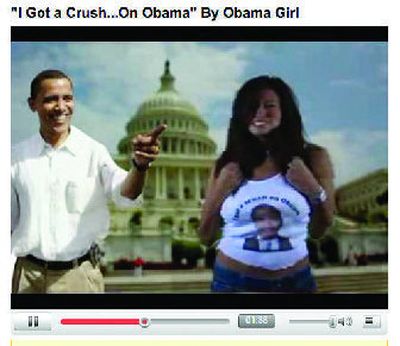Political views

This may be the first presidential campaign influenced more by the Internet than by traditional ad agencies or political parties.
Howard Kurtz, media columnist for the Washington Post, has been quoted as saying: “This is a historic shift from a world where a few important media outlets controlled the dialogue – to a game where anybody can play.”
Today, supposedly, the Internet levels the playing field for all political candidates, providing everyone the same access to voters. However, the emergence of technology such as YouTube and the many other video-oriented social networking sites blurs the line between campaign advertising and entertainment videos.
All the current presidential candidates have “channels” on YouTube at: http://www.youtube.com/ members?s=po&t=w&g=-1. And though Republicans, led by Ron Paul, are catching up with Democratic presidential contenders in the use of YouTube, Democrats – Hillary Clinton, Barack Obama and John Edwards – all show far stronger followings on that site than any Republican challenger, according to data on daily video viewership.
But what about other Internet videos that have grown out of grass-roots movements, often from third parties? What effect might they have on the voting process?
For example, how should one interpret the Clintons’ “Sopranos” video parody that has no overt political message but obviously shows the political couple as being “hip” and in the know? Found at http://www.youtube.com/watch?v= shKJk3Rph0E, it directs people to Hillary Clinton’s Web site to submit a song for her campaign. This was paid for by the Hillary Clinton for President Exploratory Committee.
Can this offset the many other anti-Hillary videos, such as “Vote Different,” released last March and already viewed by 4 million people, depicting Hillary Clinton as an Orwellian figure, a la “1984”?
That video – http://www.youtube.com/watch?v= 6h3G-lMZxjo – was supposedly sponsored by Barack Obama’s campaign, which immediately denied it; even saying the Obama campaign didn’t have the technical capability to create such a video. Later the source of the video was traced to an Obama supporter. Could anyone watch this video without being influenced?
Would it affect someone’s voting preference if they heard Hillary’s off-key rendition of the Star Spangled Banner? And how would someone interpret the Liveleak.com “Come Monday” anti-Hillary video sung by an almost-as-bad-as-Hillary singer? The words: “Come Monday you will be undone, come Monday your fall will have begun, through the lies and the tears, it’s been seven long years, it is time that the truth will be heard.”
The Internet allows you to be your own programming director; unlike on television, where you’re force-fed a program guide.
Is the video revealing Dennis Kucinich’s views on UFOs supposed to be good-natured ribbing, or does it portray him as a nut case? The video is available for anyone to see over and over again with the click of a mouse.
How about the John Edwards “Feeling Pretty” hair-styling video? He wears jeans and simple shirts, but a news story showed that he paid $400 for a haircut. I don’t think I’ve paid $400 for all the haircuts in my life. How can I relate to this guy?
And perhaps more of a mystery is the “I’ve got a crush on Obama” by Obama Girl, a shapely young singer, in an MTV-style music video – http://www.youtube.com/watch? v=wKsoXHYICqU – depicting the Illinois senator as the sexiest candidate, but directing viewers to the Web site www.barelypolitical.com, which sells MP3 downloads and videos, and appears to be very pro-Obama. It’s unclear exactly what the point of this video is – political or commercial. But people are watching: Obama Girl has over 4 million views.
As many of these videos blur the line between traditional campaign advertising and entertainment, what is the actual quality?
Robert Herold, who teaches political science at Gonzaga University, believes we’re in “uncharted territory.”
“All this YouTube stuff, I think, needs to be placed in context,” Herold said. “Specifically, America’s presidential campaigning has degenerated to a level never before seen.”